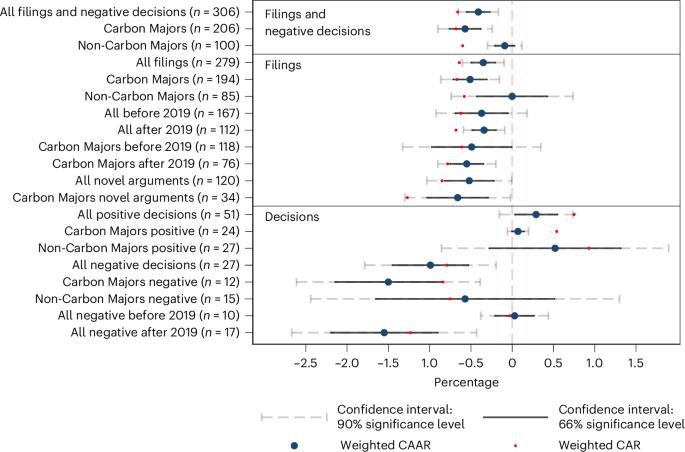Impacts of climate litigation on firm value
IF 25.7
1区 环境科学与生态学
Q1 ENVIRONMENTAL SCIENCES
引用次数: 0
Abstract
Communities and individuals are turning to courts to hold governments and high-emitting firms to account for the adverse consequences of climate change. Such litigation is part of a broader trend in which stakeholders are increasingly scrutinizing firms for their sustainability practices. For firms, rising climate litigation risk may exacerbate wider sustainability risks. Here we construct a comprehensive database of filings and decisions relating to 108 climate lawsuits against US- and European-listed firms between 2005 and 2021. We show that firms experience, on average, a 0.41% fall in stock returns following a climate-related filing or an unfavourable court decision. Cases filed against Carbon Majors, primarily the world’s largest fossil fuel producers, saw the largest stock market responses, with returns reducing by 0.57% and 1.50% following filings and unfavourable decisions, respectively. Markets respond more to ‘novel’ climate litigation involving new legal arguments or jurisdictions. Our findings suggest that climate litigation provides a way for stakeholders to challenge actual and perceived weaknesses in the sustainability practices of firms. We conclude that financial markets consider such litigation to be a relevant financial risk. Climate lawsuits can cause direct changes in corporate behaviour, but market impacts are less understood. This study examines 15 years of litigation to find how much stock values fall when lawsuits are filed or resolved.

气候诉讼对公司价值的影响
社区和个人正在诉诸法院,要求政府和高排放企业对气候变化的不利后果负责。利益相关者越来越多地对企业的可持续发展实践进行审查,此类诉讼是这一大趋势的一部分。对企业来说,气候诉讼风险的上升可能会加剧更广泛的可持续发展风险。在此,我们建立了一个全面的数据库,收集了 2005 年至 2021 年间针对美国和欧洲上市公司的 108 起气候诉讼的申请和判决。我们的研究表明,在出现与气候相关的诉讼或不利的法院判决后,企业的股票回报率平均会下降 0.41%。针对碳巨头(主要是世界上最大的化石燃料生产商)提起的诉讼对股市的影响最大,在提起诉讼和法院做出不利判决后,股票回报率分别下降了 0.57% 和 1.50%。市场对涉及新的法律论据或司法管辖区的 "新型 "气候诉讼反应更大。我们的研究结果表明,气候诉讼为利益相关者提供了一种挑战企业可持续发展实践中的实际和感知弱点的途径。我们的结论是,金融市场认为此类诉讼是一种相关的金融风险。气候诉讼可直接改变企业行为,但对市场的影响却不甚了解。本研究对 15 年的诉讼进行了研究,以发现当诉讼被提起或解决时,股票价值会下降多少。
本文章由计算机程序翻译,如有差异,请以英文原文为准。
求助全文
约1分钟内获得全文
求助全文
来源期刊

Nature Sustainability
Energy-Renewable Energy, Sustainability and the Environment
CiteScore
41.90
自引率
1.10%
发文量
159
期刊介绍:
Nature Sustainability aims to facilitate cross-disciplinary dialogues and bring together research fields that contribute to understanding how we organize our lives in a finite world and the impacts of our actions.
Nature Sustainability will not only publish fundamental research but also significant investigations into policies and solutions for ensuring human well-being now and in the future.Its ultimate goal is to address the greatest challenges of our time.
 求助内容:
求助内容: 应助结果提醒方式:
应助结果提醒方式:


